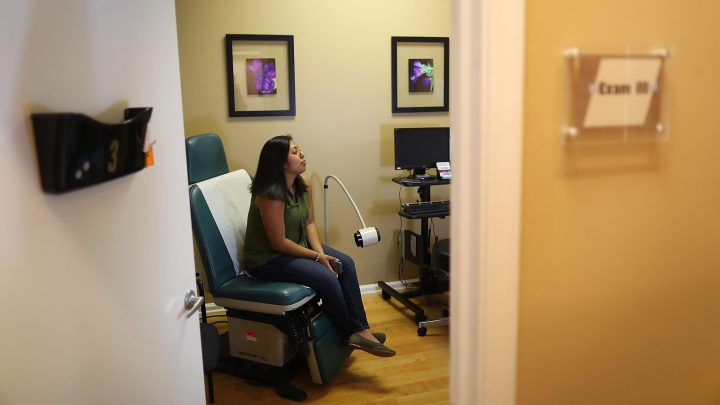
Women pay more than men for health care. That’s leading some of them to declare bankruptcy.
Women pay more than men for health care. That’s leading some of them to declare bankruptcy.

Bankruptcy still carries stigma. So Rhonda, a 48-year-old single mom in North Carolina who filed for bankruptcy, just wants us to use her first name. Her story starts in 2006; she’d taken a job with higher pay but no benefits.
“The bulk of my medical debt came from — I lost a child,” she said, sadly.
Rhonda’s daughter was breathing when she was born but soon after she died. Rhonda needed emergency surgery, blood transfusions and hospitalization. The bills added up.
“Losing my daughter was — I think that was a big lump sum — that was like, probably like $30,000, $35,000 maybe $35,000 or something? It was a lot. It was a lot of money,” she said.
Rhonda and her two sons were living paycheck to paycheck. She paid what she could on the medical debt, she said, but food and rent had to come first. More doctor bills piled up after Rhonda got COVID-19 and couldn’t work for 10 months. Her kids got sick too. Rhonda started getting phone calls and letters from debt collectors.
“So I didn’t know how to like, dig myself out of the issue that I kind of put myself in,” she explained. “So the bankruptcy was like the only option that I really had.”
Rhonda filed for bankruptcy last month. She had more than $250,000 worth of debt. Over 90% of it was medical debt, according to one of her lawyers. Women pay more for health care, even if they have insurance. A 2023 study of insured workers from Deloitte — which is a Marketplace underwriter — found that female employees spend about $266 a year more out-of-pocket for health care than their male colleagues. All that adds up, according to Dr. Kulleni Gebreyes, Deloitte’s Chief Health Equity Officer.
“What our analysis revealed was that employed women pay over $15 billion more per year for out-of-pocket health care expenses than men do,” she explained.
You may be thinking the costs of pregnancy are to blame. But Gebreyes said that women still paid more even after that was stripped out.
Because while men routinely need just one procedure with one co-pay, women’s diagnoses can be more complicated. For example, after an irregular mammogram, they need more tests like ultrasounds and will fork over a co-pay for each one. In other words, Gebreyes said, co-payments are structured for men’s care.
“Whenever we assume that there’s a universal one-size fits-all and when 50% of the population is not necessarily part of that one-size fits-all, we need to re-examine,” she said.
Gebreyes estimates that making health insurance coverage more equitable would cost employers less than $12 per worker per year.
There’s a lot happening in the world. Through it all, Marketplace is here for you.
You rely on Marketplace to break down the world’s events and tell you how it affects you in a fact-based, approachable way. We rely on your financial support to keep making that possible.
Your donation today powers the independent journalism that you rely on. For just $5/month, you can help sustain Marketplace so we can keep reporting on the things that matter to you.











